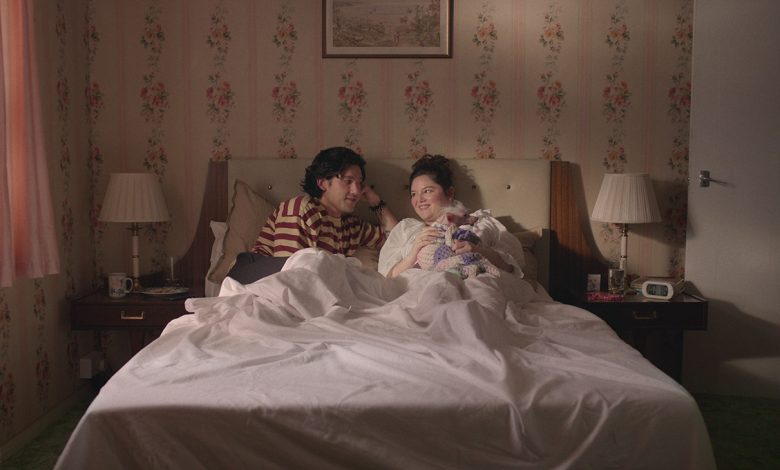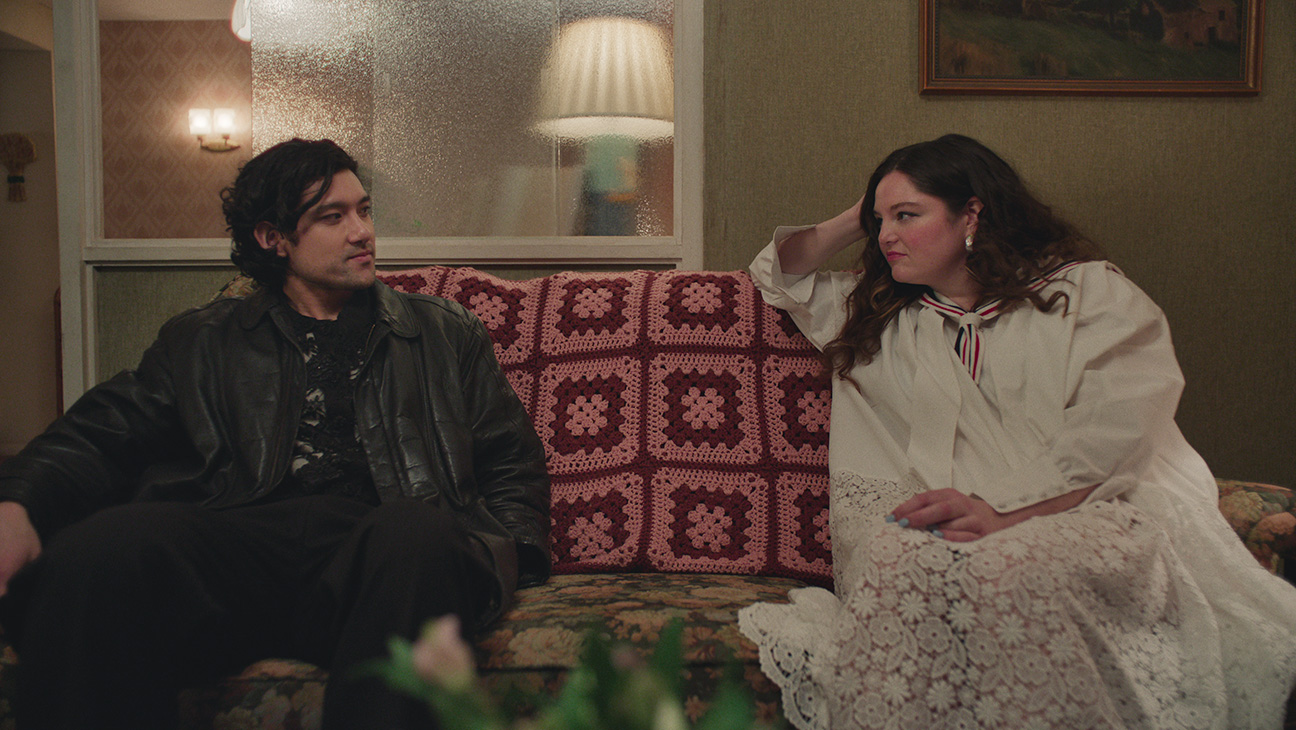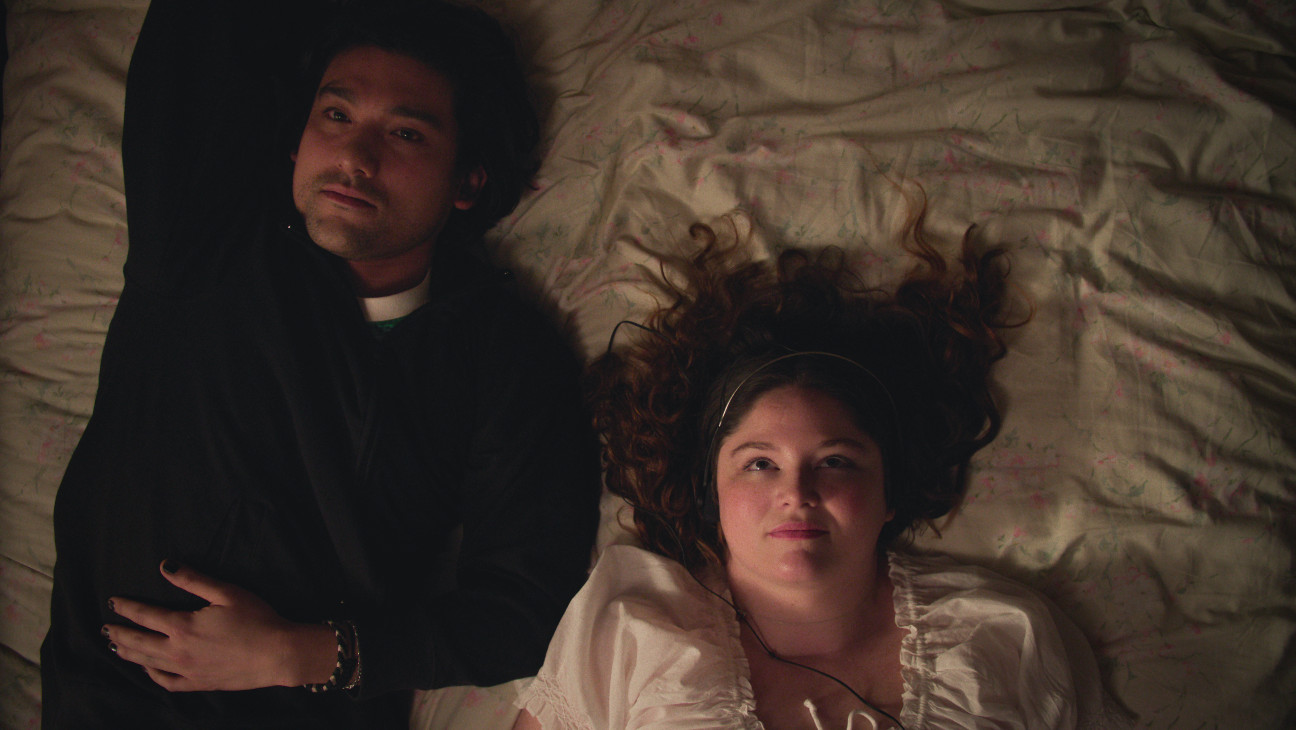Marriage Is Not the End

[This story contains major spoilers from the first season of Too Much.]
Lena Dunham knows that going into business with a romantic partner — let alone someone you have only known for a short period of time — is not for everyone. But a few years ago, about a month into their courtship, the Girls creator approached her partner, British-Peruvian indie musician Luis Felber, with an unexpected proposal: “Will you make a show with me?”
At the time, Dunham and Felber, who had met on a blind date set up by a mutual friend, were still getting to know each other. They had yet to hold hands in public, much less call each other girlfriend and boyfriend. They had barely seen — or heard about — the other person’s work. (Despite having a mother and a sister who were big fans of Girls, Felber admits he had never watched the HBO dramedy, and has only screened a couple episodes to date.)
Since moving to the U.K. during the pandemic to make the Bella Ramsey-starring film Catherine Called Birdy, Dunham had wanted to tell the story of an American woman who moves to London expecting to step into her own British romantic fantasy — only to experience severe culture shock upon arrival. But Dunham always felt she needed a strong native “counterpoint” to that classic fish-out-of-water tale.
In the early days of their relationship, Dunham and Felber would watch a lot of television together. Felber, in fact, introduced Dunham to a lot of his favorite shows, including the work of British satirist Chris Morris. As they began to discuss the shows and films which had defined their own coming-of-age, Dunham developed the sense that Felber would be the right creative foil for her long-awaited return to TV.
The final result is Too Much, which premiered last Thursday on Netflix. The 10-episode dramedy series stars Hacks scene-stealer Megan Stalter as Jessica Salmon, a New Yorker in her mid-30s who, in the midst of recovering from a bad break-up, takes a job in London assisting filmmakers working on commercials. Although she is quickly forced to abandon her dreams of falling into a classic Jane Austen romance novel — spoiler alert: Mr. Darcy does not exist in real life — Jessica finds herself falling for a grunge musician named Felix Remen (White Lotus’ Will Sharpe), whom she watches perform at a local pub one evening. It’s a messy, complicated love at first sight for two people who, as Felix puts it, “are damaged in exactly the right way” that they fit together.
In their first in-depth joint interview, co-creators Dunham and Felber open up to The Hollywood Reporter about how their real-life love story loosely inspired their latest collaboration, which the latter describes as an “indie, weirdo rom-com” in the vein of Reality Bites, The Truth About Cats and Dogs, and Punch-Drunk Love — but with a Working Title twist.
***
Lena, at the Tribeca Film Festival last month, you said of Too Much being your first big TV show since Girls, “I’ve had a lot of life between then and now, and it’s changed my perspective in ways that I am excited to be able to share.” Can you elaborate more on that? How specifically did this shift in perspective affect the direction of this new show?
LENA DUNHAM A big thing — and a very obvious thing — is that this is a love story. While Girls did contain various love stories, I would argue the biggest one is obviously between the friends, between women. I had a very skeptical, anti-romance perspective that I was really infusing everything in the show with — sex, dating, all of the dynamics. Two of the characters got divorced. I believe one of them got divorced twice. It was constant up, down, all around. I think I’ve come to have a much deeper appreciation of stability and safety and coziness.
LUIS FELBER Why is that, love?
LENA DUNHAM Oh, I’m not sure. I’ve come to have a much deeper appreciation of those things, and I think that has allowed me to tell a story that is in some ways much more conventional, but to try to do it in a way that still feels honest and connected.
Emotional baggage is a theme that has come up frequently in your discussions about the show. From a creative standpoint, how did you want Jessica and Felix to evolve individually, to the point where they decide that they want to give their romantic relationship a real shot?
FELBER With most rom-coms and most love stories, you see a version of what they think they are in front of you. But in this show, you get to learn what’s going on behind closed doors with the characters a bit more and more, and the beauty lies in the vulnerability that they have towards each other. I think that’s generally a good lesson in life and love — to learn to be vulnerable, to open yourself up. I think as a man, you don’t really show your true colors. And I’m not just talking about farting in front of someone. (Laughs.) You don’t really show your true colors until five dates in.
DUNHAM Five dates in? That seems very early.
FELBER Or 10 dates.
DUNHAM Or 10 years.
FELBER For most Brits, it’s 20 years into a marriage. But, yeah, I think with these characters, they’re both very demasiado, or “too much,” so they put it all out there. They’ve got nothing to lose, and they see that within each other, and that’s where the love and the beauty lies.
DUNHAM But there are still things that they’re not willing to say to each other, because they’re not willing to say them to themselves.
FELBER Yeah, each of them allows [the other] to bring that out eventually.
DUNHAM Something that we used in this show as a bit of a framing device is flashbacks, which are something I’ve always been very hesitant to use in my work because they always felt like they were a stand-in for exposition, or that we were going to flash back to the formative trauma that explained all of somebody’s behavior. Here, it felt like the flashbacks could be used to very gently, slowly reveal something to us about each of them.
FELBER The flashbacks — and fantasies as well — were wild, especially the Wendy Jones stuff.
DUNHAM It was about giving us more information about where their heads are at. And it was interesting to us that for the first half of the season, Felix would appear a bit more emotionally regulated than Jess. He had his small red flags, but he presented a bit like a knight in shining armor. It was only once we really understood where Jessica was coming from that we would start to unpack what Felix’s history had looked like. That was an episode that I know I never could have written on my own. Luis and I wrote it together, and it was really important to me that he be kind of water-testing it for the realism of how a man who has been raised half-British, half-something-else — but with that strong British sense of self-imposed dignity — would be managing their own trauma and what it would look like when that emerged.
FELBER And what would happen in a relationship with someone like Jessica.
Apart from the final wedding scene, which Lena referenced at Tribeca, are there any specific moments or scenes that were taken from real experiences that you two had?
DUNHAM There are definitely lines here and there. What was interesting is that Felix and Jessica are characters in a show, so by its very nature, it needs the kind of conflict that drives a 10-episode series. I felt very lucky that Lu and I personally had a fairly bump-free courtship, so we were thinking about: Had we succumbed to the worst parts of ourselves or the most shameful parts of ourselves, what would it have looked like in the context of a relationship?
That being said, there are lots of jokes that were stolen particularly directly from Lu’s mouth. And also, there’s just a general idea of someone telling you that “[you’re] too much” doesn’t mean the thing that you’ve always thought it would mean [in a negative sense]. That was something that happened early in our dynamic. Lu was the one who ultimately came up with the title for the show.

FELBER I remember saying [“You’re too much”] to you, and it really shifted something in you because I think “too much,” until then, had been something you’ve been told as a negating [comment]. But I think for me, the music is always the thing that pulls Felix closer to me. We shared songs together, and I spent a lot of time with Will, sitting with him and with the songs and making him feel comfortable. He wanted to play those songs inside out, basically. He didn’t want any sort of backing track, and he wanted it to feel like it was very natural. I was writing those songs around the time that we were making the show, so in a way I demoed them through this character within the show. So that was pretty different, I would say.
Lena, you’ve mentioned during this press run that whereas Girls was about sex, Too Much is about love. How did you think about deepening the sense of intimacy between Jess and Felix as the season progressed, and how did you think about using sex as a way for them to connect?
DUNHAM I think it was really helpful that Meg and Will just got along so well. They became immediate friends, and they were constantly giggling in a corner together. Meg got to know Will’s family; Will got to know Meg’s partner. There was a real sense of trust there. You never know — it’s a gamble when you put two people together. You hope that because you adore them both, they’ll adore each other. At the end of the day, actors can act through it, but it’s really nice if there’s a bond. So that then made creating an episode like episode three — where they’re just alone in the apartment for the entire night — such a pleasure because they came so ready to just bounce off of each other. They would come to me with ideas that they had had in hair and makeup together.
What was really important to me here was that we used sex in an intelligent, sparing way that let us understand the way that these people were connecting. But a lot of the intimacy also just comes from the comfort that they have lying on the bed and talking for three hours, or leaning on each other casually, or the little riffs that exist between the scripted lines. Those are the things that really create a sense that two people are connecting and understanding each other. It was, of course, important that you think they’re attracted to each other, but you also have to feel that they’re delighted and fascinated by the other one’s personality, which we all know is the glue that ultimately keeps couples together.
So that’s something that we were always leaning towards, and I loved that if any line felt unkind — unless they were doing a fight scene — they were very keen on the idea that they should really seem like they’re kind to each other. Because I think there’s so much onscreen flirting that basically consists of one or both parties saying something lightly insulting to the other one that then creates chemistry. (Laughs.)
FELBER I thought of the car scene after the hospital [in episode two], and he’s like, “That’s a really needy thing to say.” When we were filming that, I was like, “He’s being too mean!” But I saw it, and I was like, “That’s so cute.”
DUNHAM Lu was always on “He’s being mean” police, and I was always on “She’s being whiny” police.
FELBER That’s the thing with British and Americans. I think Americans are so naturally kind and —
DUNHAM Oh my God, you think Americans are naturally kind? Are you talking about the spirit of the country? Because we’re not very welcoming. I’m not counting myself in that, but —
FELBER No, I feel like you are. I think the British way of flirting can be seen as mean in the American eyes.
DUNHAM Totally.
FELBER So finding that sort of avenue was interesting.
DUNHAM You were saying Americans are naturally kind, and I immediately jumped to sociopolitical situations. (Laughs.)
FELBER For once, I’m not actually talking about sociopolitical things.
DUNHAM Okay, great. But it was important to us that you just feel that they’re delighted by each other and that they want to know more about each other.
Lena, your work has always been, at its core, an exploration of what it means to be a woman with agency over her own body. You’ve spoken openly about your own health struggles, and you decided to incorporate an abortion storyline into episode five. What do you hope to accomplish with that episode airing in the U.S., as abortion rights, Planned Parenthood funding and female autonomy in general are being threatened and rolled back?
DUNHAM It’s a really, really great question. I’ve worked with Planned Parenthood for 15 years. They consulted over our abortion storyline on Girls. They have been an invaluable resource, and I’ve worked on projects with them. I think being in the U.K. as Roe v Wade was overturned and then watching what has happened since then, I’ve felt an extreme sense of powerlessness, like every person concerned with reproductive rights and justice and freedom does.
It also felt important to remind people that an abortion can be an emotional choice, but it doesn’t have to be a mistake — and also to really show how loving and heroic abortion providers are. So it was important to me that the character of the abortion provider would be someone who was really able to meet Jessica where she was and hold her in her discomfort and be present for her. I never write anything from the point of view of “I’m never going to shoehorn a political statement in,” but this was a very natural conclusion for a certain arc for this character. And if we were going to do it, I wanted to do it right.
I think the most that we can always hope for with our work is that it makes people feel seen; it makes them feel recognized. It also reminds them of aspects of their life or choices that they might feel shamed by — [I want] to give them a sense of normalcy around that. That was really the goal with that scene, and the goal with Jess’ entire storyline was to say that there are a lot of different ways to be a woman. There’s a lot of different ways to be an adult, and you don’t have to be hamstrung by this very American, nuclear family-focused way of thinking about adulthood.
Luis, this is your first TV series, and Lena has indicated that you agreed to do it not thinking it would be too challenging. Now that you’ve gone through the gauntlet of creating the first season of a show, how did your actual experience compare to what you thought it would be like, and how has it affected your understanding of Lena’s work and the challenges of working in TV more broadly?
FELBER When you’re just watching things, and you’re talking to your friends or you put it on Letterboxd or whatever, you don’t really understand the hustle that it is to actually make something and get something done. I remember going on set when Lena was making Catherine Called Birdy, and I did the soundtrack for that as well, but I only went on set one day and it was quite overwhelming. But Lena is like the master and commander of a set, and such an incredible educator and teacher and so patient. I’m an independent artist. I’d never really had people above me telling me how things should be done — or at least for the last seven years.
The moment you make a TV show, you have to become part of this incredible team and learn to let people have that space to do their things in. And that in itself was a learning curve for me, but I would definitely want to do it again. Synecdoche in New York is one of my favorite movies because it’s just so fascinating, the idea of making something on that level. I feel like Lena’s such an incredible partner to do that with, and it was just such an incredible, beautiful experience.
DUNHAM We were laughing because when the show ended, Lu was like, “We just did this six months of production. How long do we get to take off?” I was like, “Three days. We get to take three days off.” Tim Bevan always says, “You spend two years making it and two hours watching it, so you better make it a pleasant experience.” I think that’s another thing that’s come with age. It’s my ability to savor that I love being on set, and that it’s not just a means to an end. It’s a whole reality in which I love to exist — and not everybody loves the set. My family members will come on and go, “Oh my God, that was the most overwhelming 45 minutes of my life.”
FELBER My mom wanted to leave after 20 minutes. She thought she was coming to see a play or something, and she was like, “I need to go home. It’s too much!”
DUNHAM But I was really happy that Lu took to it the way that I do.
FELBER I’m a huge fan of Curb Your Enthusiasm, so I felt a little like Larry. But music’s a huge part of it, and being able to make a record parallel to this [show] gave me sanity in my own world. And then being able to score a 10-episode series was just so fun. Me and my music partner, Matt [Allchin], had so much fun delving into the sonic glue which glues the world of Too Much together — and the onscreen music and working with people like Rita Ora was so fun.

The first season ends with Jessica and Felix getting married, but Felix does joke to Jessica: “How long do you wanna stay married?” Will told me that he interpreted that line as a kind of cheeky wink to the audience that undercuts the happy ending that most people would expect of this rom-com genre.
FELBER It could have also just been a really bad joke. (Laughter.)
DUNHAM Well, I was going more for the undercut, though. You were like, “That’s a bad joke.” And I was like, “No, that’s a terrible omen.”
What would a second season of Too Much look like? What would you be most looking forward to mining from the early years of your own marriage and exploring with Jessica and Felix as newlyweds?
DUNHAM In terms of the second season, we’re not there yet. But when I think about where these characters would go, when Luis and I talk about it, what we’re really thinking about is that marriage is not the end of a love story — it’s the beginning. And especially with two characters who don’t know each other well and who feel like they have because of this kind of radical intimacy they’ve experienced, they actually haven’t dealt with an enormous amount of life as a team.
So [we’d be] looking at what happens when two people make the decision to be together and then are thrust into the reality of each other’s worlds. These two don’t know each other’s families yet. They don’t know each other’s friends. They don’t know what the other person is like in a certain kind of conflict. They don’t know how the other person handles the big challenges. They’ve never decorated a home or talked about whether they want children. There’s so much that they skipped over — and some of that is taken from our [real] life, some of it isn’t. But we got married after six months, we’ve been married now for almost four years, and I think our marriage has been this constant education and full of surprises about who the other one is — many of them wonderful.
But I think that [it’s interesting] to get to see something that we often don’t get to see in romantic comedy films, which is: What happens after the kiss at the end, after the curtain is drawn, and how do these people behave? I also think marriage — and the demands of marriage — is changing so much. Marriage is no longer [about how] a woman makes an agreement to raise a man’s children so that he will make sure that their family is fed and clothed. It’s taken on so many new dimensions, especially with the changes in how women engage in the workforce, changes to the way that we think about masculinity. So those are all things that I think would be really exciting to explore with these two characters.
Lena, you’ve been hard at work for the last little while on your next Netflix rom-com, Good Sex, which will center around a 40-something couples therapist who re-enters the dating scene.
DUNHAM We are about a quarter through our shoot. Lu’s working away on the score. And as expected, no spoilers here — Natalie Portman is a very, very good actress. It’s playing with the romantic comedy form to try to say something about our expectations about relationships, about love and about sex. I think my favorite romantic comedies — whether it’s When Harry Met Sally, or Four Weddings and a Funeral, or Love and Basketball — I mean, these are movies that challenge our perceptions about what love is in the era that we live in. So that was the goal here, and it’s just a joy to be with Natalie, Rashida Jones, Mark Ruffalo, Meg Ryan [who Dunham actually approached about the role at a Taylor Swift concert] and Tucker Pillsbury a.k.a. Role Model. They’re all such interesting performers who are bringing such specificity to these parts, and I’m really enjoying my time in the trenches of this genre.
***
Too Much is now streaming on Netflix. Read THR’s finale postmortem with stars Megan Stalter and Will Sharpe.
Source: Hollywoodreporter
HiCelebNews online magazine publishes interesting content every day in the TV section of the entertainment category. Follow us to read the latest news.





